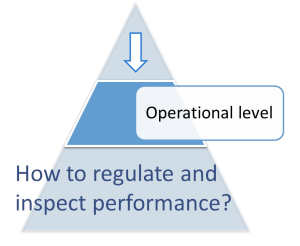Regulation: introduction
Course subject(s)
Module 4: Governance and Regulation in complex situation
Regulation: introduction
The successful development and performance of infrastructure – electricity, natural gas,telecommunications, water, and transportation – depends for an important part on the adoption of appropriate public policies and the effective implementation of these policies. 
In this unit, we move from the governance level to the operational level. This means that we’re moving from the general to the specific. Or more precisely, we’re moving from the grander feel-good concepts of public values to the ways in which these public values are actually operationalized. This also means that we’re moving from the highest levels of governments to the governmental agencies that actually put public values into practice, into something they can observe and act upon. Indeed, we are talking about regulation. Although regulation is often associated with markets and ‘level playing fields’, it is much more that that. It is of critical importance in ensuring equity, greater inclusion in policy and law making, protecting rights and standardization.
Reforms of infrastructure sectors since the 1980s have resulted in major growth in the number of regulatory agencies around the world. The success and sustainability of reforms in these sectors will in large part depend upon the professionalism of these agencies, and the quality of the work that they undertake.
Similar to what we saw in the previous unit, regulation is always a dynamic process. There will also be major differences between countries. Country context matters. Countries vary in their cultures, stages of development, priorities, histories, and institutional capabilities to name just a few. Read on for a little more history.
Questions for pondering
As you read the articles and watch the next web lectures try to reflect on what is needed for effective regulation? How do you go from a feel good policy principle (affordability, equity, etc.) to actual regulation? What is required for effective regulation? What are the pitfalls? How effective is regulation in your area? Is it ‘long, loud and legal’.

Next Generation Infrastructures by TU Delft OpenCourseWare is licensed under a Creative Commons Attribution-NonCommercial-ShareAlike 4.0 International License.
Based on a work at https://ocw.tudelft.nl/courses/next-generation-infrastructures/.



